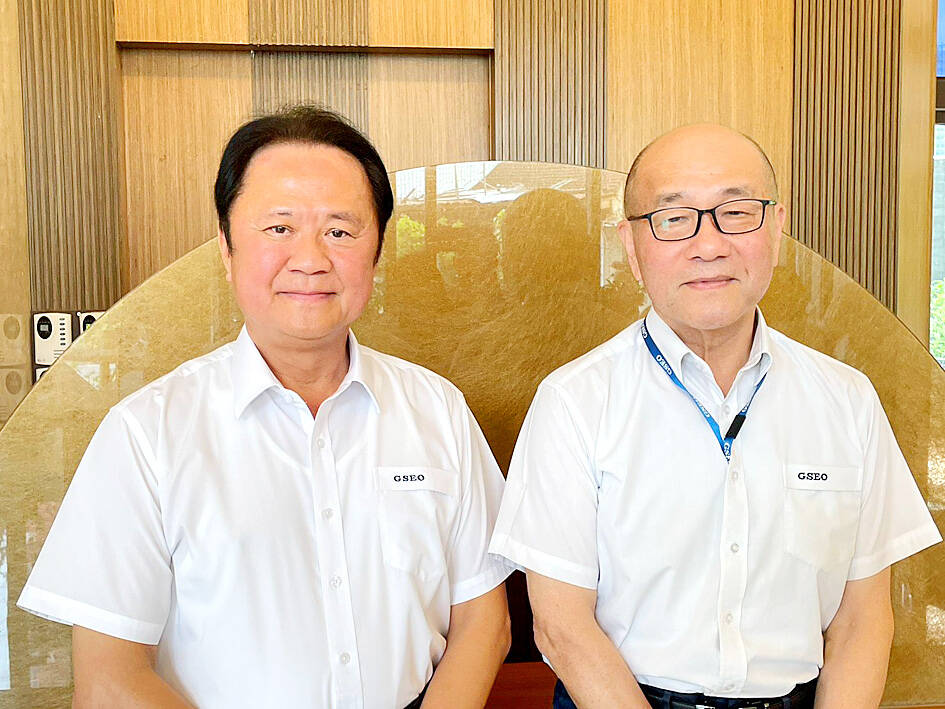Genius Electronic Optical Co (GSEO, 玉晶光), a supplier of handset camera lenses for Apple Inc’s iPhones, yesterday said it expects order momentum to gain steam in the second half of this year due to the launch of new smartphones and growing adoption of high-margin periscope lenses.
As the third quarter is traditionally the peak season for the smartphone industry, and as customers have already begun placing orders, the company’s business performance is expected to improve from this month, company chairman Jones Chen (陳天慶) told reporters in Taichung following the company’s annual shareholders’ conference, the Chinese-language Liberty Times (sister paper of the Taipei Times) reported.
“The amount of orders in the second half of this year is expected to be higher than the same period last year. However, the company’s business is still facing pressure from tariffs and currency exchange rates, which might weigh on our subsequent sales and order intake,” Chen was quoted as saying.

Photo: Ou Yu-hsiang, Taipei Times
Genius’ revenue last month fell 32.55 percent month-on-month, down 19.56 percent year-on-year to NT$1.251 billion (US$42.36 million) — the company’s lowest monthly revenue since June 2023, it said.
Cumulative revenue for the first five months of this year declined 2.79 percent annually to NT$8.426 billion, it said.
The company attributed last month’s revenue decline primarily to a reduction in virtual reality (VR) lens orders from customers, while the seasonal slowdown in the smartphone market during the second quarter also dampened demand.
Genius over the past few years has made inroads into the VR and augmented reality (AR) segments in an effort to diversify revenue sources beyond handset lenses.
Genius president Lee Kuo (郭英理) said that while US tariffs have not yet been finalized, there has been no specific impact on the company’s business.
The only concern is that weakening end-market demand related to tariff uncertainty might weigh on the company’s performance in the second half of the year, he said.
However, a strong pipeline of new products this year, along with smoother periscope lens production compared with last year, is expected to support sales growth, he added.
Genius operates manufacturing facilities in Taichung and the Chinese city of Xiamen.
Despite concerns over potential US tariffs, customers have not asked the company to establish a third production base, he said.
Internally, the company is evaluating whether to establish a new manufacturing site outside of Taiwan and China, with Vietnam, Thailand and Malaysia under consideration, but no final decision has been made yet, Kuo said.
The company reported capital expenditure of nearly NT$3 billion last year and estimated that this year’s spending would be similar to last year’s level.
Shareholders yesterday approved a cash dividend of NT$18 per share, representing a payout ratio of 45.94 percent based on last year’s earnings per share of NT$38.35 — a record high for the company.

Sweeping policy changes under US Secretary of Health and Human Services Robert F. Kennedy Jr are having a chilling effect on vaccine makers as anti-vaccine rhetoric has turned into concrete changes in inoculation schedules and recommendations, investors and executives said. The administration of US President Donald Trump has in the past year upended vaccine recommendations, with the country last month ending its longstanding guidance that all children receive inoculations against flu, hepatitis A and other diseases. The unprecedented changes have led to diminished vaccine usage, hurt the investment case for some biotechs, and created a drag that would likely dent revenues and

Global semiconductor stocks advanced yesterday, as comments by Nvidia Corp chief executive officer Jensen Huang (黃仁勳) at Davos, Switzerland, helped reinforce investor enthusiasm for artificial intelligence (AI). Samsung Electronics Co gained as much as 5 percent to an all-time high, helping drive South Korea’s benchmark KOSPI above 5,000 for the first time. That came after the Philadelphia Semiconductor Index rose more than 3 percent to a fresh record on Wednesday, with a boost from Nvidia. The gains came amid broad risk-on trade after US President Donald Trump withdrew his threat of tariffs on some European nations over backing for Greenland. Huang further

CULPRITS: Factors that affected the slip included falling global crude oil prices, wait-and-see consumer attitudes due to US tariffs and a different Lunar New Year holiday schedule Taiwan’s retail sales ended a nine-year growth streak last year, slipping 0.2 percent from a year earlier as uncertainty over US tariff policies affected demand for durable goods, data released on Friday by the Ministry of Economic Affairs showed. Last year’s retail sales totaled NT$4.84 trillion (US$153.27 billion), down about NT$9.5 billion, or 0.2 percent, from 2024. Despite the decline, the figure was still the second-highest annual sales total on record. Ministry statistics department deputy head Chen Yu-fang (陳玉芳) said sales of cars, motorcycles and related products, which accounted for 17.4 percent of total retail rales last year, fell NT$68.1 billion, or

HSBC Bank Taiwan Ltd (匯豐台灣商銀) and the Taiwan High Prosecutors Office recently signed a memorandum of understanding (MOU) to enhance cooperation on the suspicious transaction analysis mechanism. This landmark agreement makes HSBC the first foreign bank in Taiwan to establish such a partnership with the High Prosecutors Office, underscoring its commitment to active anti-fraud initiatives, financial inclusion, and the “Treating Customers Fairly” principle. Through this deep public-private collaboration, both parties aim to co-create a secure financial ecosystem via early warning detection and precise fraud prevention technologies. At the signing ceremony, HSBC Taiwan CEO and head of banking Adam Chen (陳志堅)